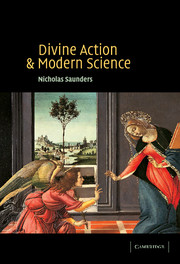Book contents
- Frontmatter
- Contents
- Preface
- Chapter 1 Motivations
- Chapter 2 Theological approaches to divine action
- Chapter 3 The laws of nature and miracles
- Chapter 4 Determinism and SDA
- Chapter 5 Divine action and quantum theory
- Chapter 6 Does God cheat at dice?
- Chapter 7 Chaos Theory and divine action
- Chapter 8 Whole–part models of SDA
- Chapter 9 Is SDA really tenable?
- References
- Index
Chapter 2 - Theological approaches to divine action
Published online by Cambridge University Press: 02 December 2009
- Frontmatter
- Contents
- Preface
- Chapter 1 Motivations
- Chapter 2 Theological approaches to divine action
- Chapter 3 The laws of nature and miracles
- Chapter 4 Determinism and SDA
- Chapter 5 Divine action and quantum theory
- Chapter 6 Does God cheat at dice?
- Chapter 7 Chaos Theory and divine action
- Chapter 8 Whole–part models of SDA
- Chapter 9 Is SDA really tenable?
- References
- Index
Summary
We have been introduced to a wide variety of God's actions in the preceding pages from lot casting, to Near Eastern and Old Testament statements about the power of God, and to the assertion that some forms of God's action derive a unique status from countermanding the autonomous regularity of nature. In the discussion we have also already used a number of criteria with which to evaluate claims about God's action and impliedly focussed on issues such as the development of scientific method, the coherency of God's nature, and whether it is meaningful to have a solely metaphorical interpretation of SDA. It is now necessary to set some of these concepts onto more solid philosophical foundations and in this chapter we shall consider some of the approaches that have been adopted to these issues.
A necessary preliminary is to clarify the exact parameters of the study of God's action we are undertaking. Owen Thomas has helpfully produced a taxonomy of the different types of question we might ask about the nature of SDA based on the different potential meanings of the word ‘action’ (Thomas 1983). There are essentially five different types of question about God's activity in the world:
By what means does divine action occur? (e.g. quantum manipulation or overruling the laws of nature).
What is the relationship between divine and finite causation? (e.g. complementary or mutually exclusive).
How often does SDA occur? (e.g. continuous, only fitful or not at all)
What is the effect that SDA achieves? (e.g. to heal diseases or inspire an individual).
[…]
- Type
- Chapter
- Information
- Divine Action and Modern Science , pp. 17 - 47Publisher: Cambridge University PressPrint publication year: 2002



